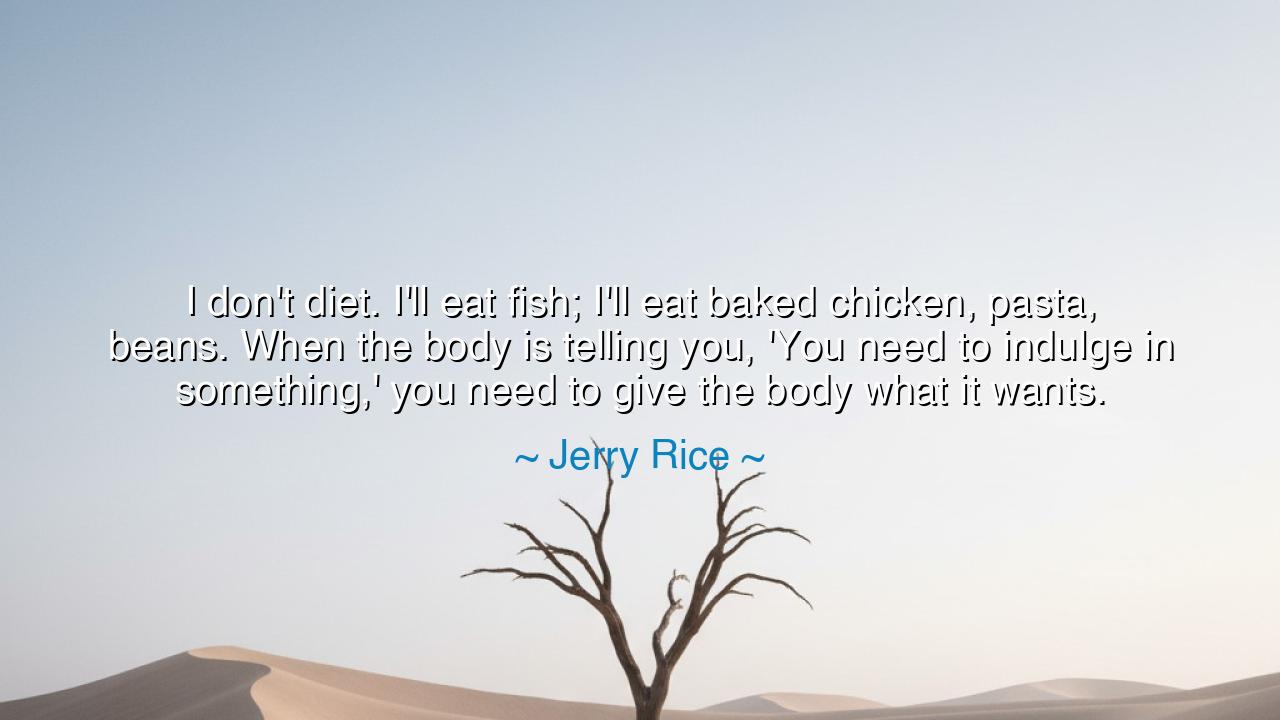
I don't diet. I'll eat fish; I'll eat baked chicken, pasta
I don't diet. I'll eat fish; I'll eat baked chicken, pasta, beans. When the body is telling you, 'You need to indulge in something,' you need to give the body what it wants.






In the words of Jerry Rice, the legendary athlete whose dedication redefined the art of discipline, we find a truth both simple and profound: “I don’t diet. I’ll eat fish; I’ll eat baked chicken, pasta, beans. When the body is telling you, ‘You need to indulge in something,’ you need to give the body what it wants.” These words, spoken from a life built upon balance and perseverance, reveal the ancient wisdom that the body, if listened to with care, becomes not a burden but a guide — a living temple that speaks the language of harmony.
To say “I don’t diet” is not to reject discipline, but to honor a deeper understanding: that health is not found in rigid denial, but in balance. The body is not an enemy to be starved or punished; it is a partner in the long journey of excellence. Jerry Rice, whose name became synonymous with endurance, did not achieve greatness through excess or deprivation, but through awareness — an awareness of what nourishes, what restores, what sustains. His body, sculpted by years of relentless work, was not mastered through force, but through respect.
The ancients, too, knew this truth. In the schools of Greece, the philosopher Hippocrates, father of medicine, declared, “Let food be thy medicine and medicine be thy food.” He taught that each person’s constitution is unique, and that wisdom lies in listening to what the body requires. When the body whispers its needs — for rest, for nourishment, for movement — the wise do not ignore it. For when man listens to the body, he hears the song of nature itself. Rice’s philosophy echoes this ancient harmony: he eats simply, yet fully; he works intensely, yet restores deeply.
In his mention of fish, chicken, pasta, and beans, we see not indulgence, but moderation — the sacred middle path between excess and abstinence. The Romans, masters of both discipline and celebration, lived by the maxim in medio stat virtus — “virtue stands in the middle.” To eat mindfully, to train faithfully, to rest wisely — these are acts of balance, and balance is the essence of mastery. For the one who swings too far toward deprivation weakens the spirit, and the one who feasts without measure dulls the will. Rice’s words remind us that true strength comes from equilibrium — from knowing when to push, and when to yield.
Consider also the story of the samurai, the ancient warriors of Japan. They lived by the code of Bushido, in which self-control and awareness of the body were sacred. Before battle, they ate modestly but wisely — a bowl of rice, a bit of fish, a sip of tea — for they understood that clarity of mind and strength of body were not born of indulgence nor starvation, but of balance. Like the samurai, Jerry Rice honors his body not through denial, but through harmony. His diet is not a list of restrictions; it is a rhythm of listening — a conversation between strength and need.
And when he says, “When the body tells you to indulge, you must listen,” he speaks of more than hunger. He speaks of intuition — that quiet wisdom that guides both athlete and sage. The body, like the soul, requires moments of joy, moments of satisfaction. To deny them endlessly is to harden the heart; to grant them thoughtlessly is to dull the edge. Thus, the wise do not live by rule alone, but by awareness. The indulgence Rice speaks of is not gluttony, but restoration — the act of giving the body what it truly needs, not what the mind mindlessly craves.
This is the lesson we must take: treat the body not as a prisoner, but as a vessel of life. Feed it with good things, move it with purpose, rest it with reverence. When it asks, listen. When it hungers, give it nourishment; when it tires, grant it rest. Do not follow fads or fears — follow the rhythm of your own nature. The diet of the wise is not written in books, but written in the pulse of their being.
So, O listener, let this teaching be your guide: discipline is sacred, but so is balance. The path to health is not paved with restriction, but with respect. As Jerry Rice teaches through his words and his life, the one who listens to his body walks in harmony with life itself — and that harmony, once found, becomes not only the secret of fitness, but the secret of peace. For in honoring the body, we honor the spirit that dwells within it — and thus we become, in every sense, whole.






AAdministratorAdministrator
Welcome, honored guests. Please leave a comment, we will respond soon